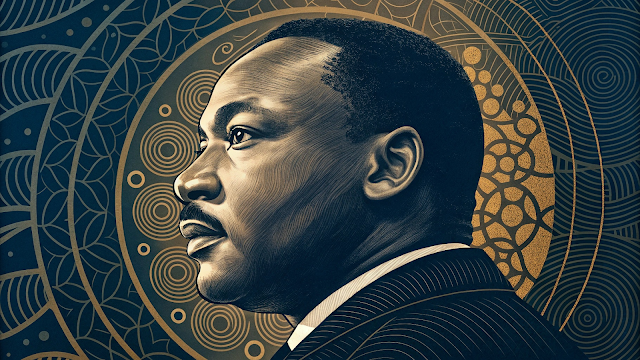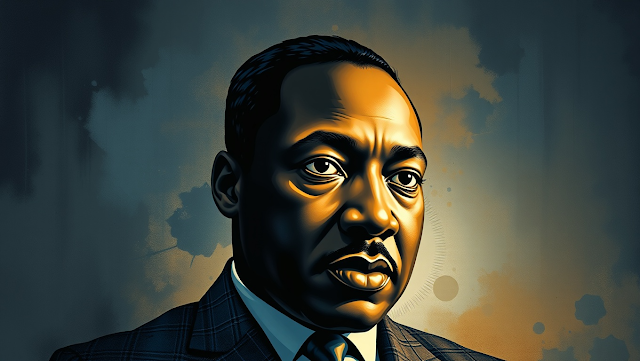"Perhaps the worst sin in life is knowing right and not doing if." - Martin Luther King Jr.
"아마도 인생에서 가장 큰 죄는 옳은 것을 알면서도 행하지 않는 것이다." - 마틴 루터 킹 주니어.
The Moral Imperative of Action: Dr. King's Call to Ethical Responsibility
Dr. Martin Luther King Jr. (1929-1968) was an American Baptist minister, activist, and one of the most influential leaders of the Civil Rights Movement. His advocacy for nonviolent civil disobedience, grounded in his Christian beliefs and inspired by Mahatma Gandhi's philosophy, led to pivotal changes in American society. Dr. King received the Nobel Peace Prize in 1964 for combating racial inequality through nonviolent resistance. Beyond his famous "I Have a Dream" speech, his profound insights on justice, equality, and moral responsibility continue to guide ethical discourse worldwide. His statement that "Perhaps the worst sin in life is knowing right and not doing it" encapsulates his philosophy that moral knowledge demands moral action.
마틴 루터 킹 주니어 박사(1929-1968)는 미국의 침례교 목사, 활동가, 그리고 민권 운동의 가장 영향력 있는 지도자 중 한 명이었습니다. 그의 기독교 신념에 근거하고 마하트마 간디의 철학에 영감을 받은 비폭력 시민 불복종 옹호는 미국 사회의 중요한 변화를 이끌었습니다. 킹 박사는 비폭력 저항을 통한 인종 불평등 퇴치로 1964년 노벨 평화상을 수상했습니다. 그의 유명한 "나에게는 꿈이 있습니다" 연설을 넘어, 정의, 평등, 그리고 도덕적 책임에 대한 그의 심오한 통찰력은 계속해서 전 세계적인 윤리적 담론을 이끌고 있습니다. "아마도 인생에서 가장 큰 죄는 옳은 것을 알면서도 행하지 않는 것이다"라는 그의 말은 도덕적 지식이 도덕적 행동을 요구한다는 그의 철학을 요약합니다.
The Gap Between Knowledge and Action
"Perhaps the worst sin in life is knowing right and not doing it." In this powerful statement, Dr. King identifies a fundamental moral failing that transcends specific ethical systems. He points to the critical gap between moral knowledge and moral action—between recognizing what justice requires and actually working to bring it about. This gap exists in matters large and small, from witnessing everyday injustices without speaking up to recognizing systemic oppression without taking a stand. Dr. King suggests that mere awareness of what is right, without corresponding action, not only fails to fulfill our moral obligations but constitutes a particular kind of moral failure—one that involves a conscious choice to ignore what we know to be true.
"아마도 인생에서 가장 큰 죄는 옳은 것을 알면서도 행하지 않는 것이다." 이 강력한 진술에서, 킹 박사는 특정 윤리 시스템을 초월하는 근본적인 도덕적 실패를 식별합니다. 그는 도덕적 지식과 도덕적 행동 사이의 중요한 간극—정의가 요구하는 것을 인식하는 것과 실제로 그것을 실현하기 위해 노력하는 것 사이—을 지적합니다. 이 간극은 목소리를 내지 않고 일상적인 불의를 목격하는 것부터 입장을 취하지 않고 체계적인 억압을 인식하는 것까지, 크고 작은 문제에 존재합니다. 킹 박사는 상응하는 행동 없이 옳은 것에 대한 단순한 인식은 우리의 도덕적 의무를 이행하지 못할 뿐만 아니라 특정한 종류의 도덕적 실패—우리가 진실이라고 알고 있는 것을 무시하는 의식적인 선택을 포함하는—를 구성한다고 제안합니다.
Complicity Through Inaction
Dr. King's philosophy suggests that inaction in the face of recognized injustice makes us complicit in that injustice. Throughout his activism, he frequently addressed the problem of the "moderate" or "silent majority" who recognized racial injustice but remained passive. In his famous "Letter from Birmingham Jail," he wrote that he was "gravely disappointed with the white moderate" who preferred order over justice and who believed time alone would solve social problems. This perspective holds that moral neutrality is impossible when injustice is recognized—we either act against it, thereby fulfilling our moral responsibility, or our inaction effectively supports the status quo, making us participants in the wrong we recognize but fail to address.
킹 박사의 철학은 인식된 불의 앞에서의 무행동이 우리를 그 불의에 공모하게 만든다고 제안합니다. 그의 활동 전반에 걸쳐, 그는 인종 불의를 인식했지만 수동적으로 남아있는 "중도파" 또는 "침묵하는 다수"의 문제를 자주 다루었습니다. 그의 유명한 "버밍엄 감옥에서의 편지"에서, 그는 정의보다 질서를 선호하고 시간만으로 사회 문제가 해결될 것이라고 믿는 "백인 중도파에 심각하게 실망했다"고 썼습니다. 이 관점은 불의가 인식될 때 도덕적 중립성이 불가능하다고 주장합니다—우리는 그것에 대항하여 행동함으로써 우리의 도덕적 책임을 이행하거나, 우리의 무행동이 효과적으로 현상 유지를 지지하여, 우리가 인식하지만 다루지 못하는 잘못에 참여자가 됩니다.
The Courage of Moral Action
Dr. King's statement implicitly acknowledges that acting on moral knowledge often requires courage. Doing what is right frequently involves personal risk, social disapproval, or material sacrifice. The gap between knowing and doing is often maintained not by lack of understanding but by fear of consequences. Throughout his life, Dr. King exemplified the courage his philosophy demanded—facing imprisonment, violence, and ultimately assassination because he refused to separate his moral knowledge from his actions. His life demonstrates that moral integrity sometimes requires paying a high price, but his statement suggests that the spiritual and ethical cost of inaction is even higher.
킹 박사의 진술은 도덕적 지식에 따라 행동하는 것이 종종 용기를 필요로 한다는 것을 암묵적으로 인정합니다. 옳은 일을 하는 것은 종종 개인적 위험, 사회적 불승인, 또는 물질적 희생을 수반합니다. 아는 것과 행하는 것 사이의 간극은 종종 이해의 부족이 아니라 결과에 대한 두려움에 의해 유지됩니다. 그의 일생 동안, 킹 박사는 그의 철학이 요구하는 용기를 모범적으로 보여주었습니다—그가 자신의 도덕적 지식을 행동과 분리하기를 거부했기 때문에 투옥, 폭력, 그리고 궁극적으로 암살에 직면했습니다. 그의 삶은 도덕적 진실성이 때로는 높은 대가를 치러야 함을 보여주지만, 그의 진술은 무행동의 영적, 윤리적 비용이 더 높다고 제안합니다.
Personal and Collective Responsibility
Dr. King's insight applies at both personal and collective levels. Individually, we each face moments when we recognize the right course of action but hesitate to pursue it due to convenience, comfort, or fear. Collectively, societies often acknowledge injustices—poverty, discrimination, environmental degradation—without mobilizing sufficient resources or will to address them effectively. Dr. King's philosophy suggests that both individual and collective moral failures stem from this same fundamental sin: the failure to translate moral knowledge into moral action. His life's work focused on building movements that could bridge this gap, creating collective action powerful enough to address injustices that individuals alone could not solve.
킹 박사의 통찰력은 개인적 수준과 집단적 수준 모두에 적용됩니다. 개인적으로, 우리는 각자 올바른 행동 과정을 인식하지만 편의, 편안함, 또는 두려움 때문에 그것을 추구하기를 주저하는 순간에 직면합니다. 집단적으로, 사회는 종종 불의—빈곤, 차별, 환경 악화—를 인정하지만 그것들을 효과적으로 다루기 위한 충분한 자원이나 의지를 동원하지 않습니다. 킹 박사의 철학은 개인적 및 집단적 도덕적 실패가 모두 이 동일한 근본적인 죄에서 비롯된다고 제안합니다: 도덕적 지식을 도덕적 행동으로 변환하지 못하는 것. 그의 일생의 작업은 이 간극을 메울 수 있는 운동을 구축하는 데 초점을 맞추어, 개인들이 혼자서는 해결할 수 없는 불의를 다룰 수 있을 만큼 강력한 집단 행동을 만들었습니다.
Conclusion
Dr. King's assertion about the sin of inaction continues to challenge and inspire us today. In a world where information about injustice is more accessible than ever, the gap between knowing and doing remains a critical moral issue. His words remind us that moral awareness creates moral responsibility—that once we recognize what is right, we incur an obligation to act accordingly. This perspective offers both a sobering assessment of our moral shortcomings and a hopeful path forward. By closing the gap between our moral knowledge and our actions, we not only avoid what Dr. King considered perhaps the worst sin, but we also participate in the creation of the more just and compassionate world he envisioned and worked toward throughout his extraordinary life.
무행동의 죄에 대한 킹 박사의 주장은 오늘날에도 계속해서 우리에게 도전하고 영감을 줍니다. 불의에 대한 정보가 그 어느 때보다 접근하기 쉬운 세상에서, 아는 것과 행하는 것 사이의 간극은 여전히 중요한 도덕적 문제로 남아 있습니다. 그의 말은 도덕적 인식이 도덕적 책임을 만든다는 것—우리가 옳은 것을 인식하면, 그에 따라 행동할 의무를 지게 된다는 것—을 상기시킵니다. 이 관점은 우리의 도덕적 결함에 대한 냉정한 평가와 희망적인 앞으로의 길을 모두 제공합니다. 우리의 도덕적 지식과 행동 사이의 간극을 좁힘으로써, 우리는 킹 박사가 아마도 가장 큰 죄라고 여겼던 것을 피할 뿐만 아니라, 그가 그의 비범한 삶 전체에 걸쳐 구상하고 노력했던 더 정의롭고 자비로운 세상의 창조에 참여합니다.







